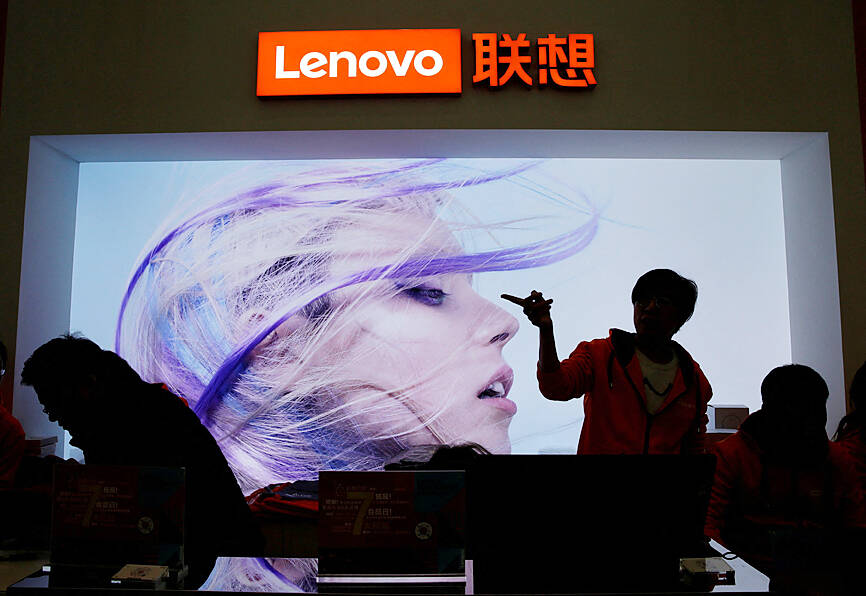Lenovo Group Ltd (聯想) reported a smaller-than-expected profit decline after PC demand showed signs of recovering from a bout of post-COVID-19 weakness.
The world’s largest PC maker reported a 54 percent fall in net income to US$249.2 million for the three months ended September, compared with analysts’ average estimate of US$224.9 million. Revenue was US$14.4 billion, matching the average projection.
It was the fifth straight decline in quarterly revenue and the fourth straight fall in net income, as an anticipated Chinese economic recovery fell short of expectations.

Photo: Reuters
Lenovo, HP Inc and Dell Technologies Inc are grappling with an industry downturn that emerged after the COVID-19 era, driven by rapid inflation and economic uncertainty around the globe.
However, that downward spiral slowed in the third quarter, research firm International Data Corp (IDC) said.
Lenovo, whose shipments fell 5 percent, managed to keep the top position, despite HP narrowing the gap, IDC said.
Shipments are “well on track” to begin coming back from the fourth quarter, which would help ease inventory and improve Lenovo’s margins, UOB Kay Hian analyst Johnny Yum wrote in a memo ahead of the earnings release.
“The new replacement cycle should start to kick in in 2024 with the upcoming Windows update,” Yum said.
Lenovo’s shares have gained almost 50 percent this year, driven by anticipation of demand for artificial training (AI) training servers and data center construction in China.
Longer term, the US has expanded restrictions on chip exports to its political rival, a move that could hamstring AI development and affect Lenovo’s server business.
The Chinese company buys advanced processors from US chip suppliers like Advanced Micro Devices Inc to Nvidia Corp for its consumer and enterprise products.
Senior Lenovo executives reassured analysts in a call last month that the company was working with suppliers to determine which products were subject to the rule, Citigroup analyst Carrie Liu wrote.
Lenovo’s net income could fall as much as 5 percent between fiscal 2024 and 2026 if US curbs hit its server unit in China, Goldman Sachs analysts Verena Jeng and Allen Chang estimated ahead of the earnings release.
The Infrastructure Solutions Group accounted for less than 15 percent of the company’s sales last fiscal year, but is more profitable than consumer electronics, such as PCs and smartphones.
“Lenovo’s diversified customer base could support the company’s AI server customer base diversification, managing the negative impact,” Jeng and Chang said.

Taiwan Semiconductor Manufacturing Co (TSMC, 台積電) would not produce its most advanced technologies in the US next year, Minister of Economic Affairs J.W. Kuo (郭智輝) said yesterday. Kuo made the comment during an appearance at the legislature, hours after the chipmaker announced that it would invest an additional US$100 billion to expand its manufacturing operations in the US. Asked by Taiwan People’s Party Legislator-at-large Chang Chi-kai (張啟楷) if TSMC would allow its most advanced technologies, the yet-to-be-released 2-nanometer and 1.6-nanometer processes, to go to the US in the near term, Kuo denied it. TSMC recently opened its first US factory, which produces 4-nanometer

GREAT SUCCESS: Republican Senator Todd Young expressed surprise at Trump’s comments and said he expects the administration to keep the program running US lawmakers who helped secure billions of dollars in subsidies for domestic semiconductor manufacturing rejected US President Donald Trump’s call to revoke the 2022 CHIPS and Science Act, signaling that any repeal effort in the US Congress would fall short. US Senate Minority Leader Chuck Schumer, who negotiated the law, on Wednesday said that Trump’s demand would fail, while a top Republican proponent, US Senator Todd Young, expressed surprise at the president’s comments and said he expects the administration to keep the program running. The CHIPS Act is “essential for America leading the world in tech, leading the world in AI [artificial

REACTIONS: While most analysts were positive about TSMC’s investment, one said the US expansion could disrupt the company’s supply-demand balance Taiwan Semiconductor Manufacturing Co’s (TSMC, 台積電) new US$100 billion investment in the US would exert a positive effect on the chipmaker’s revenue in the medium term on the back of booming artificial intelligence (AI) chip demand from US chip designers, an International Data Corp (IDC) analyst said yesterday. “This is good for TSMC in terms of business expansion, as its major clients for advanced chips are US chip designers,” IDC senior semiconductor research manager Galen Zeng (曾冠瑋) said by telephone yesterday. “Besides, those US companies all consider supply chain resilience a business imperative,” Zeng said. That meant local supply would

Servers that might contain artificial intelligence (AI)-powering Nvidia Corp chips shipped from the US to Singapore ended up in Malaysia, but their actual final destination remains a mystery, Singaporean Minister for Home Affairs and Law K Shanmugam said yesterday. The US is cracking down on exports of advanced semiconductors to China, seeking to retain a competitive edge over the technology. However, Bloomberg News reported in late January that US officials were probing whether Chinese AI firm DeepSeek (深度求索) bought advanced Nvidia semiconductors through third parties in Singapore, skirting Washington’s restrictions. Shanmugam said the route of the chips emerged in the course of an